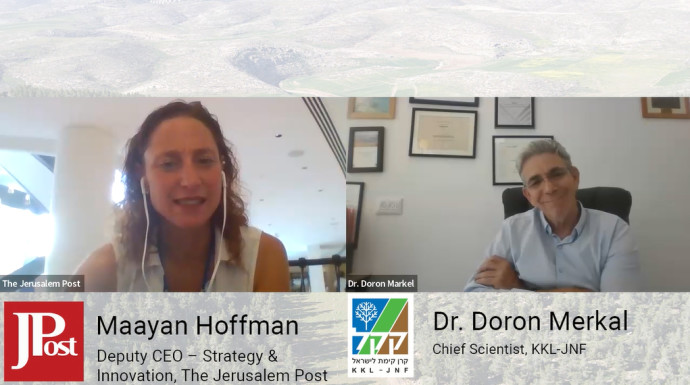In a one-on-one interview with Maayan Hoffman, Deputy CEO - Strategy & Innovation for the Jerusalem Post, Doron Markel, Chief Scientist at Keren Kayemeth LeIsrael-Jewish National Fund (KKL-JNF), explains why the organization, as Israel’s forest service, is especially attuned to current issues regarding the climate crisis and the role that KKL-JNF is playing in combating this vital issue.
“We are confronting extreme climate events,” says Markel, “and we we need to be prepared for even more extreme climate events in the future. KKL-JNF has been connected to climate processes for many years, because it is the forest service of Israel and manages Israel’s forests. The forests are affected by climate change, but it also impacts and affects the climate in exchange, because the forest and the trees are the main tool we have to remove the carbon from the atmosphere.”

This summer, says Markel, the world has had to deal with severe heat waves in Europe, North America, and the Middle East. In explaining the causes for these high temperatures, he says, “Usually, I don’t like to connect every specific weather event with climate, physical processes, and climate change or global warming. However, in this case, one should connect the heat waves with global warming, because there is global warming and average temperatures over the world increased a few weeks ago.”
Markel notes that in the past two years, KKL-JNF has made a strategic decision to be even more proactive in combating the climate crisis, and is taking measures in climate mitigation, which is defined as reducing the flow of heat-trapping greenhouse gases into the atmosphere and climate adaptation, adjusting to current and future effects of climate change. As Chief Scientist at KKL-JNF, he leads research and development in these two areas.
In defining Israel’s role in fighting climate extremes, he adds, “KKL-JNF has the forest, which so far is the one and only tool to reduce carbon in the atmosphere in Israel.” In addition, the organization is spearheading research and development in technologies designed to reduce emissions and increase carbon fixation. Among them are KKL-JNF’s Climate Scholarship Program, a scholarship program for thirty-six doctoral students whose doctoral research is in the field of climate crisis, as well as its Climate Solution Prize, conducted in conjunction with JNF Canada, which offers $1 million in prizes for groundbreaking research to mitigate the climate crisis.
“I hope and believe that Israeli technology can make a change in our ability to meet Israel’s energy goals,” says Markel, “and perhaps even make a worldwide change – a type of Tikun Olam (repair of the world) to reduce worldwide emissions and mitigate the climate crisis.”